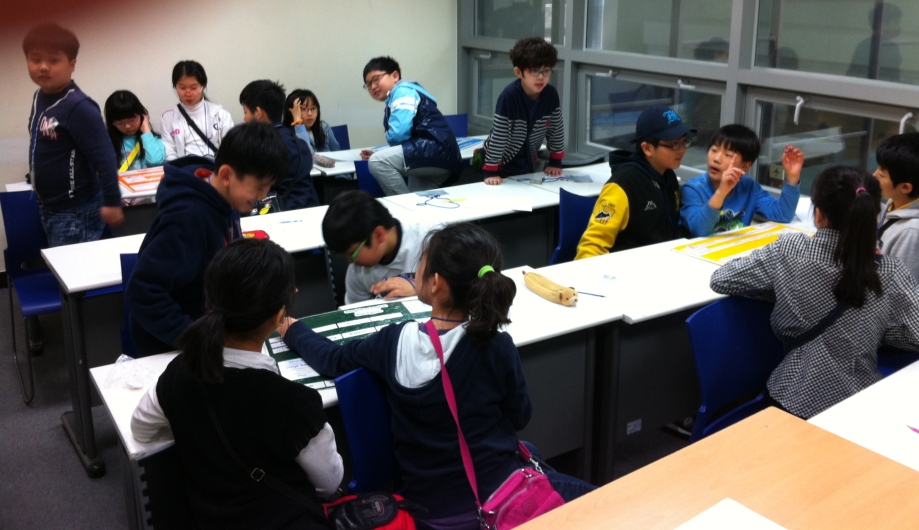April was a very trying month for me. There has been some really crappy stuff going on at work these days (well, actually for the past 6 months), but I’m not going to get into all of that. What I will say is that I logged 34 hours of overtime in the last five weeks and only had 6 days off. And next week we have to work six days again. My legs are tired from standing 9 hours a day while teaching so I sit down every chance I get. My body is tired, and that makes my mind groggy. On Monday I had a meltdown in my apartment and started kicking over full water bottles. It was very therapeutic!
The hardest thing to do when I’m exhausted like this is have patience with the kids who come to my work. Many of you know that I’m currently working at an English Village in Seoul, South Korea. A while ago I described what that’s like. You can read about it here if you’d like to know more. This week in particular has been weird. We had very high level kids on Monday and Tuesday. One of them was so good at English that he successfully used air quotes in describing to me how “Konglish” is a term we use to describe words used in Korea that sound like they are “English” but actually are not truly English. However, kids are kids. Despite them having excellent comprehension, it still took great amounts effort and time to get them to be quiet for long enough that they’d listen to the rules of games and group activities. Then on Wednesday afternoon a caravan of buses arrived with 19 teams of 4th graders who are constantly trying to speak to me in Korean, despite the fact that I shrug my shoulders and tell them that I don’t speak Korean every time. Getting them to be quiet is like trying to push water back into a yard hose.
The teachers use several techniques in class and group activities to get the students’ attention. Sometimes we say “Clap one time. Clap two times. Clap three times.” The students usually comply, and upon the third clap they are supposed to put their hands on their head and be quiet. We also have one where we say, “When I say ‘Be’ you say ‘quiet.’ BE! (Quiet!) BE! (Quiet!).” Other times we just tap a rhythm out on the microphone using our fingers and the children have to mimic it with claps. Since the students usually know me as “Lion teacher” I often make growling noises into the mic that grab their attention. These are just a few examples of things we commonly do, but I’ve tried hundreds of other things as well.
It’s very easy to grab the children’s attention. It’s getting them to shut their mouths that’s hard.
I have a lot of patience. I understand that it’s difficult to listen to someone try to explain something to you in a language you only partially comprehend. I also understand that they are very excited to be at our camp where they can be with their friends 24 hours a day. I also also understand, but very much do not condone, that the kids go to the on-campus 7-11 after EVERY meal and buy ridiculous amounts of sugary snacks and drinks that they ingest about 30 minutes before they are required to sit still in classes for hours.
Sometimes my patience runs out and I shout at a class. On Monday, with the smart kids, I was at that point but instead of shouting I got very quiet. When the students finally realized that I was angry with them they started hushing each other. I explained to them that in my culture it is VERY rude to talk when someone is speaking directly to you. To make sure they were getting it I made an analogy they would understand. “When you ignore me and talk to your friend when I’m speaking to you, it is like you are giving me the middle finger.” They were dumbfounded. “Teacher, really?” Their reaction, in turn, dumbfounded me. Obviously, they were very bright and talented students; you don’t get a whole school’s worth of that kind without discipline. Yet somehow they’d never been taught that ignoring someone was rude.
It reminded me of a time when Jessie and I went to a wedding in Korea. Seoul has these giant wedding halls which are preset with round tables for the guests, a super-long aisle for the bride and groom to walk up and down, and a rocking speaker system. We sat fairly far back so we watched the wedding on the wall monitor near our table. The crazy thing was that if I never looked at the monitor or the stage I probably wouldn’t have known that it was going on! All around the room, as the ceremony was happening, people were continually talking, getting up, going to talk with people at other tables and talking loudly on their cell phones. Only about 1 in 6 people looked remotely interested in what was happening on the stage. However, as soon as the two were pronounced married things changed. People were focused and determined like you’ve never seen before. Their objective: to get the best spot they could in the buffet line in the dining room next door.
That’s one experience I will never forget. I often use it to remind myself that things are different here. One time when our head teacher Robbie was on the microphone trying to get a large group of children to sit down in their team lines they all just kept walking out of the room and talking with each other, oblivious to his stern tone. Natalie, my friend and co-teacher from England, looked at me with a bewildered expression. Throwing my hands up in defeat I replied, “Korean wedding!”
I’m not writing this to say that Koreans are rude. In general, they aren’t. I know many nice people here. But I’ve noticed that in group settings this behavior seems to be way more acceptable than it would be back home. I guess what I’m learning from all this is that I need to be very cognizant of the things that anger me. I know that the kids aren’t deliberately trying to snub me. I know that there are cultural differences at play. This goes a long way in helping me control my anger when the children aren’t being compliant.
So the next time things get out of control and you start to feel your skin boil, throw your hands up to the sky like Frank Costanza and say “Korean wedding!”


